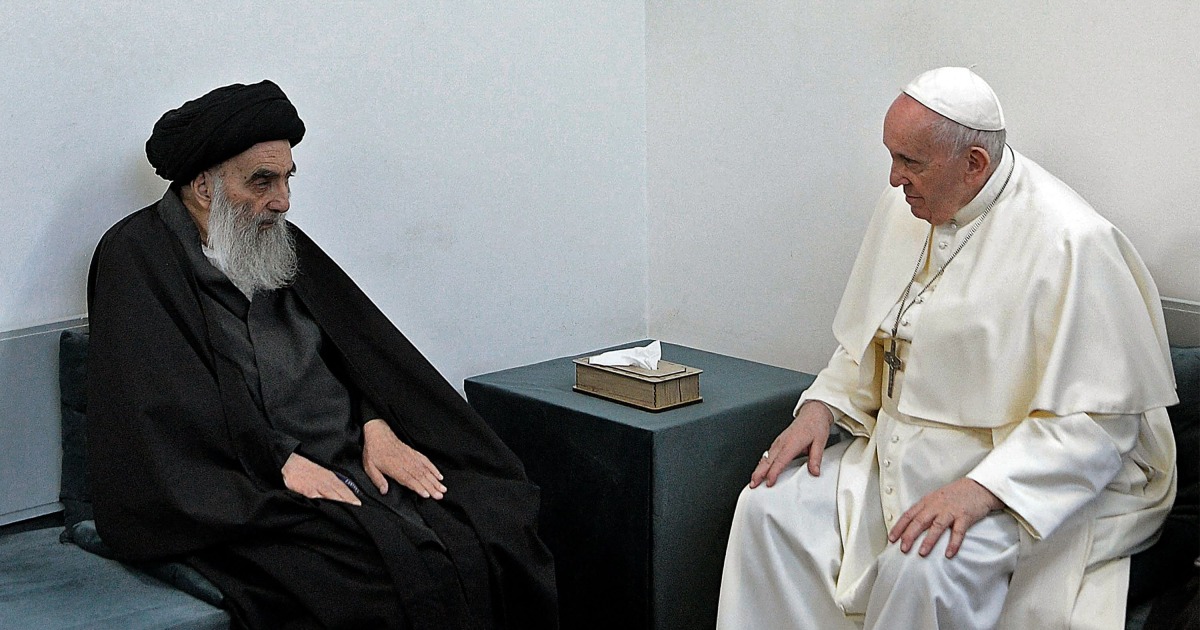Pope Francis had a historic meeting with a senior Shiite cleric in Iraq on Saturday and called for greater interfaith unity by visiting Abraham’s birthplace as part of his turbulent journey through the Middle East country.
Francis, 84, met with Grand Ayatollah Ali al-Sistani, 90, at his home in the holy city of Najaf, in central Iraq, where the two elderly men of faith provided a highly symbolic moment of tolerance for a country marked by sectarianism and violence.
“Religious and spiritual leadership must play a big role in ending the tragedy,” said Sistani, the spiritual leader of millions of Shiite Muslims, in a statement after the meeting.
He also called for “wisdom” to prevail and “erase the language of war”.
The pontiff met with the ascetic and somewhat reclusive spiritual figure for 45 minutes in Sistani’s humble house, along a narrow alley near the golden-domed Imam Ali shrine.
An official photo from the Vatican showed Sistani in his traditional black Shiite tunic and turban sitting in front of Francisco in his white cassock.
With an almost mythical stature among millions of followers, Sistani rarely appears in public, but he intervened at critical moments in Iraq’s history. His decrees sent Iraqis to the polls for the first time in 2005 and brought together hundreds of thousands to fight ISIS in 2014.
“The Holy Father stressed the importance of collaboration and friendship between religious communities,” the Vatican said in a statement after the visit.
The meeting was an opportunity for the Pope to “thank” Sistani who “raised his voice in defense of the weakest and most persecuted” during the violence of recent years, the statement said.
After the meeting, Francis traveled to the desert plain of Ur, in southern Iraq, revered as the birthplace of Abraham – the patriarch of monotheism and a unifying prophet of Islam, Christianity and Judaism.
Praising young Muslims for helping Christians to repair their churches, Francis emphasized the importance of interreligious coexistence and brotherhood in his speech.
“From this place, where faith was born, from the land of our father Abraham, we will say that God is merciful,” he said. “Hostility, extremism and violence are not born out of a religious heart: they are betrayals of religion,” he added.
With the desert wind blowing, Francis sat down with Muslim, Christian and Yazidi leaders and spoke about the ancient archaeological ruins of the 4,000-year-old city.
Download the NBC News app for complete coverage of the coronavirus outbreak
The Pope’s trip, which began Friday, will take four days. It comes amid a second wave of coronavirus cases in Iraq and a wave of rocket attacks, while a rivalry between the United States and Iran unfolds on Iraqi soil.
Greeted with white doves, folk dances, honor guard and colorful street graffiti, Francis’ visit increases national pride and offers a rare opportunity for Iraqis to be at the center of positive news. The oil-rich country is still struggling after the 2003 US-led invasion plunged it into chaos.
Francis said he was also making the trip to show solidarity with Iraq’s Christian community – one of the oldest in the world – which has dropped to about 300,000 from about 1.5 million 20 years ago.
“I am more than happy to have the pope visit,” Iraqi Christian Feras Ramzi, 46, told NBC News. “This is a message from the Vatican that he will not forget his sons and daughters in Iraq.”
Comrade Christian Fadi Slewa, 39, a chef from Baghdad, also welcomed the visit.
“The Pope came to Iraq offering peace,” he said. “Peace is the language that all Iraqis must speak, regardless of whether they are Christians, Muslims or other religions.”
On the flight back to Baghdad at the end of Saturday, Francis must celebrate Mass in a central cathedral. He will then travel north to Mosul on Sunday, a former Islamic State stronghold.
Iraqi President Barham Salih thanked Francis for making his first papal visit to Iraq, despite some requests for him to postpone the trip.
“Iraq has been through difficult times,” Salih told NBC News on Friday. “He came to help us have a better day.”
Reuters contributed to this report.
Richard Engel and Saphora Smith contributed.


